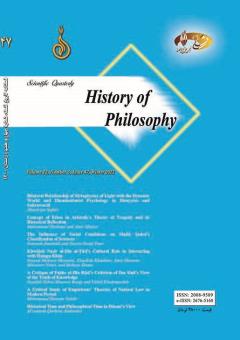Concept of Ethos in Aristotle’s Theory of Tragedy and its Historical Reflection
Subject Areas : ریشهشناسی مکاتب و آراء فلسفی در ادوار قدیم و جدیدMohammad Hashemi 1 , Amir Maziyar 2
1 - PhD candidate of Philosophy of Art, Faculty of Law, Theology, and Political Science, Islamic Azad University, Science and Research Branch, Tehran, Iran
2 - Assistant Professor (corresponding author), Department of Philosophy of Art, Faculty of Theories and Art Studies, Tehran University of Art, Tehran, Iran
Keywords: Aristotle, ethos, Character, action, Poetics, conscious moral choice, principle of ethical middle term,
Abstract :
In Aristotle’s view, an ideal tragic hero must be neither a villain nor a virtuous man but a character who stands between these two extremes based on a conscious process of choice. In order to explain ethos, the study inquires about the roles of conscious ethical choice, external virtues, and the similarities between the hero and the addressee in the unity of action and hero in Aristotle’s view. Moreover, it asks about the basis upon which the historical reflection of this unity can be studied. This paper aims to investigate the relationship between Aristotle’s theory of tragedy and philosophy of ethics and its historical reflection relying on the relationship between act and moral character in his Poetics and the related sections in his other treatises. Here, the author demonstrates that action and hero in a tragedy together present some imitations of the essence and ethical nature of the world. The historical reflection of Aristotle’s ethical approach to tragedy can be studied based on the theories related to the principiality of ethics and the relationship between art and ethics. This qualitative study has been conducted following a descriptive-analytic method.
